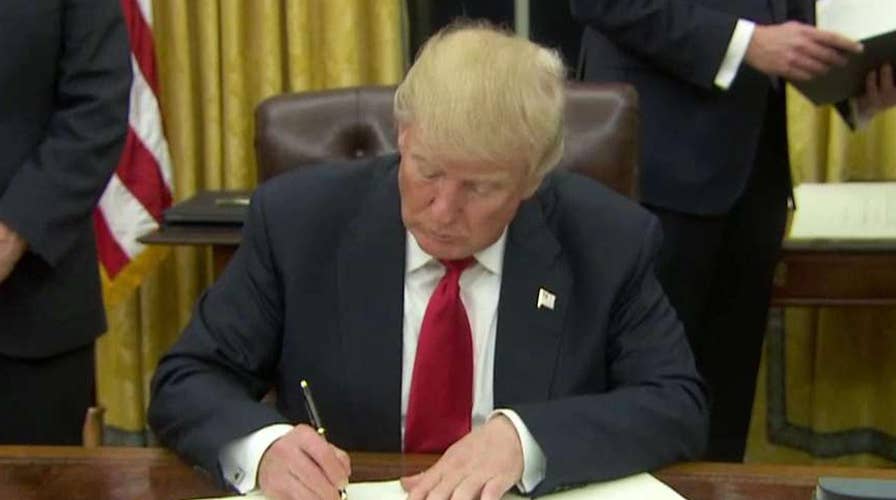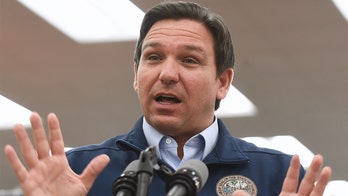In his first hours as president Friday, Donald Trump ordered federal agencies to "ease the burden" of ObamaCare while his chief of staff directed an immediate regulatory freeze.
Trump was joined in the Oval Office by Vice President Mike Pence, Chief of Staff Reince Priebus and other top advisers as he signed the executive order on former President Barack Obama's signature health law, which Trump opposed throughout his campaign.
The order, which noted that Trump intends to seek the law's "prompt repeal," directs agencies to "minimize the unwarranted economic and regulatory burdens [of ObamaCare] and prepare to afford the States more flexibility and control to create a more free and open healthcare market." It also tells agencies to waive, defer or delay imposing any ObamaCare provisions that impose fiscal penalties on states, health care providers, families or individuals.
Trump's order also ordered agency heads to "encourage the development of a free and open market in interstate commerce for the offering of healthcare services and health insurance," a key component of Republicans' ObamaCare replacement plan.
Priebus' memo says that agencies shouldn't submit any regulations to be published in the Federal Register unless a Trump-selected agency head approves it. That appears to mean that some regulations that had been approved by Obama's administration would be halted. It also freezes any regulations that are already in the pipeline to be published and allows time for other pending regulations to be reviewed by Trump's administration.
The memo is similar to one that Obama's chief of staff issued the day Obama was inaugurated in 2009.
Trump also signed the commissions for his first two Cabinet appointments. Secretary of Defense James Mattis and Secretary of Homeland Security John Kelly were easily confirmed by the Senate earlier in the day. Both men were formally sworn in by Pence in a hastily arranged ceremony in the Eisenhower Executive Office Building, where the vice president's suite of offices is located.
Asked about his first day as president, Trump described it as "busy but good -- a beautiful day."
Most of Trump's first substantive acts as president will wait until Monday, his first full work day at the White House.
Shortly after being sworn in, Trump switched between the official business of governing and the pageantry of his inauguration, making his first official moves as president in an ornate room steps from the Senate floor. Flanked by Pence and congressional leaders before his congressional luncheon, Trump praised each of his Cabinet nominees as he signed the papers formalizing their nominations. He also engaged in banter with his new congressional rivals, including Senate Democratic leader Chuck Schumer of New York and House Democratic leader Nancy Pelosi of California.
There were others signs the new government was up and running. Federal websites and agencies immediately began reflecting the transfer of power, and WhiteHouse.gov was revamped for Trump's policy priorities as pages about LGBT rights and the Obama administration's climate change plan were eliminated.
Shortly after Trump became president, the Department of Housing and Urban Development suspended the Obama administration's planned reduction of mortgage insurance premium rates, a move that had been intended to make buying a home more affordable.
More significant policy announcements are expected in the early days of the Trump administration.
Trump's spokesman has said the president intends to withdraw from the 12-nation Trans-Pacific Partnership deal, which he views as detrimental to U.S. businesses and workers. He has also promised to renegotiate the two-decades-old Clinton era North American Free Trade Agreement or withdraw from it.
Given Trump's opposition to Obama's immigration actions, he could also cancel the Deferred Action for Childhood Arrivals program, or DACA, which has protected about 750,000 young immigrants from deportation. The program also offered those immigrants work permits.
Trump also faces an early choice of naming a Supreme Court justice to fill the vacancy left by the late Justice Antonin Scalia. Trump has said he will announce a nominee in about two weeks.
Other issues poised to receive early action include energy, where Trump is likely to undo regulations on oil drilling and coal, and cybersecurity, where he has already said he will ask for a report on the strength of the nation's cyber defenses within 90 days of taking office.
Fox News' John Roberts and the Associated Press contributed to this report.





